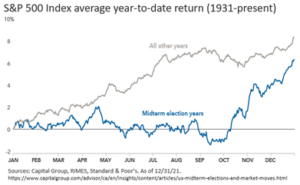 Midterm primaries are upon us. As such, it is worthwhile to examine if and how midterm elections impact the market. It should be noted that an aggregated historical review is by no means prognostication of the current year, as the future remains unknown.
Midterm primaries are upon us. As such, it is worthwhile to examine if and how midterm elections impact the market. It should be noted that an aggregated historical review is by no means prognostication of the current year, as the future remains unknown.
A recent study by analysts at the Capital Group (best known for their American Funds mutual fund offerings) indicates months leading up to midterm elections tend to display lackluster performance with heightened volatility. Yet, as election day draws closer, equities typically spring forward in an upward trajectory. These characteristics add credence to the idea that the stock market does not like any type of uncertainty.
Muted returns suggest investors tend to keep their voting dollars in their pocket. This should make some sense as the governmental policy can influence economic behavior. Unfortunately, this is flawed thinking. Governmental policy is often a result of compromise, it is rarely implementation in the purist form communicated during campaigns. Second, in a vast majority of the cases, governmental policy has a lagged implementation effect. There is not a clear understanding of the full impact until years if not decades later. A good example are the housing and mortgage laws and rules implemented in the late 1990s which culminated in a speculative housing market of the mid-late 2000s and contributed to the ’08-’09 world credit crisis.
Higher volatility accompanies the performance lull. This could be due to campaigns’ ebb and flow, especially as campaigns tend to highlight the negative, riling up emotions and increasing uncertainty.
Three Possible Outcomes and Possible Policy Direction
1) Republicans take the House and the Senate: White House’s agenda is limited; focus on bipartisan efforts
2) Democrats retain the House and the Senate: Democrats move forward with Build Back Better
3) Congress is split: Curtail President’s agenda and tax/spend policies
Candidates and the media can get us wrapped up in the politics of the day. Yet, financial markets monitor a much wider data set and model a larger number of circumstances beyond those posed by Washington or a state’s governor’s office. It is important to consider, politics and its ramifications play an important role in shaping our society, but markets tend to transcend party quarrels.
The S&P 500 Index is the Standard & Poor’s Composite Index of 500 stocks and a widely recognized, unmanaged index of common stock prices. You cannot invest directly in an index. Forward looking statements may be subject to certain risks and uncertainties. Actual results, performance, or achievements may differ materially from those expressed or implied. The opinions expressed are those of Heritage Financial and not necessarily those of Lincoln Financial Advisors Corp.
CRN-4822834-06282


Recent Comments